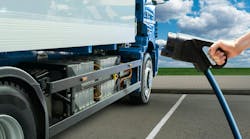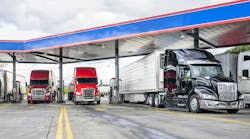As annual production numbers for biodiesel increase rapidly, the National Biodiesel Board (NBB) is warning the trucking industry to pay closer attention to the properties and production values behind the biodiesel they put in their fuel tanks.
“Biodiesel is a story I like to call ‘The Good, The Bad, and The Ugly,’” Richard Nelson, an NBB engineer, said during a speech at PHH Truck Services' recent annual fleet management conference in Westin, FL. “First, it's a good fuel. It's renewable, has high cetane and lubricity properties, and has virtually no sulfur, so it complies with the 2006 ULSD [ultralow-sulfur diesel] fuel mandate.”
But the “bad” part of biodiesel's story revolves around the glycerin levels in the fuel, said Nelson. While a little is good, as it improves the fuel's lubrication properties, too much can lead to the formation of deposits on diesel engine injections, thus ruining them. Glycerin also turns into waxing crystals in cold temperatures, clogging up fuel filters, he said. “Once biodiesel goes bad, it gets ugly quickly,” noted Nelson.
Glycerin is an unavoidable byproduct of biodiesel, which is officially defined as mono-alkyl esters of long chain fatty acids derived from vegetable oils or animal fats, including oils made from soybeans, canola, and sunflower seeds, along with animal fats used to cook French fries and other foods. Making sure biodiesel is produced correctly to provide fuel of consistent quality is NBB's current focus.
This is a major issue as biodiesel production is booming, according to NBB, rising from just 5 million gal. of annual production in 2001 to over 650 million gal. a year in 2007. Though that's a small amount compared to the 63 billion gal. of diesel used in the U.S. every year, Nelson said ensuring biodiesel quality is a top priority if the fuel is to maintain a significant presence.
Currently, only a B100 production specification exists. Recently, the American Society for Testing and Materials upgraded that standard to ASTM D 6751-06a, adding new limits on calcium and magnesium to ensure that biodiesel blends of up to 20% (B20) will be compatible with 2007 diesel exhaust emissions technology.


